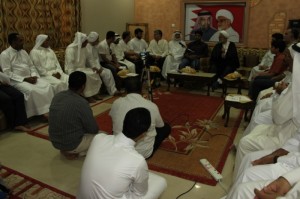Bahrain’s unfolding crackdown
 Since the middle of Ramadan, when I wrote about Bahrain’s sweep of Shia activists, the government has announced charges against 23 alleged coup plotters, saying they were planning to overthrow the government with funding from abroad, mainly Iran.
Since the middle of Ramadan, when I wrote about Bahrain’s sweep of Shia activists, the government has announced charges against 23 alleged coup plotters, saying they were planning to overthrow the government with funding from abroad, mainly Iran.
Bahraini human rights activists continue to protest the government’s detention of hundreds of Shia politicians and activists; on Sept. 11 they began a “sit-in,” pictured here, demanding an end to torture and the release of all those detainees not charged with a crime.
King Khalifa gave an angry speech, saying the years of tolerance and pardons were over, while the government belatedly started making a case to public opinion beyond the Gulf, addressing the allegations of torture and illegal detention while also articulating claims that the Shia political opposition figures it arrested pose an actual threat to the state.
Bahrain’s Ambassador to the U.S., Houda Ezra Ebrahim Nonoo, wrote in her letter to the Times:
Against the backdrop of continuing incidences of violence and public disorder, arrests were made because significant evidence was discovered of a network planning and instigating attacks on public property and inciting violence. … Our commitment to further reform within an open, tolerant Middle East society remains undiminished.
Solid evidence could help that case, but so far the Bahrain case highlights some really interesting regional questions.
- Can the ruling families in the heterogenous Gulf countries find a way to extend minority rights while maintaining stability?
- Are the Shia minorities in Bahrain, Kuwait and Saudi Arabia seriously interested in taking power, like the Shia in Iraq, or will they be satisfied with a more fair political system?
- Is Iran actively stirring up the Shia in the Gulf countries as a threat to ruling families, or are we seeing nothing more than flow of alms money from religious Shia through their references – usually based in Iran and Iraq – back to the faithful in the Gulf?
- How much rule of law is possible in states were absolute authority is concentrated in the hands of a single, hereditary ruling family?
- What is the Khalifa family trying to accomplish long-term? And what prompted the timing of this wave of arrests: Real information about a prospective coup? Concerns that Shia parties would win a majority in the October parliamentary elections? Real worry that simmering unrest would hurt Bahrain’s ability to win and retain foreign companies?
The Bahraini press has begun to publish some of the government’s answers to these questions. There have been some newspaper columns in the Gulf that express the ruling families’ fear of Iran-backed Shia uprisings, an anxiety that has percolated throughout the peninsula in various forms for centuries.
Steven Sotloff wrote an excellent piece on The Middle East Channel about Bahrain’s Shia crackdown, in which he details a lot of the background in what he describes as conflict not between Shia and Sunni but between the Shia majority and the ruling Khalifa family. Sotloff gives us a lot of useful detail about the government’s housing policy, which favors newly naturalized Sunni immigrants recruited for the security forces over long-time Shia citizens, and other Shia grievances about employment and political rights. His measured tone helps referee a lot of the heated claims about Iranian funding, dual loyalty and sedition.

